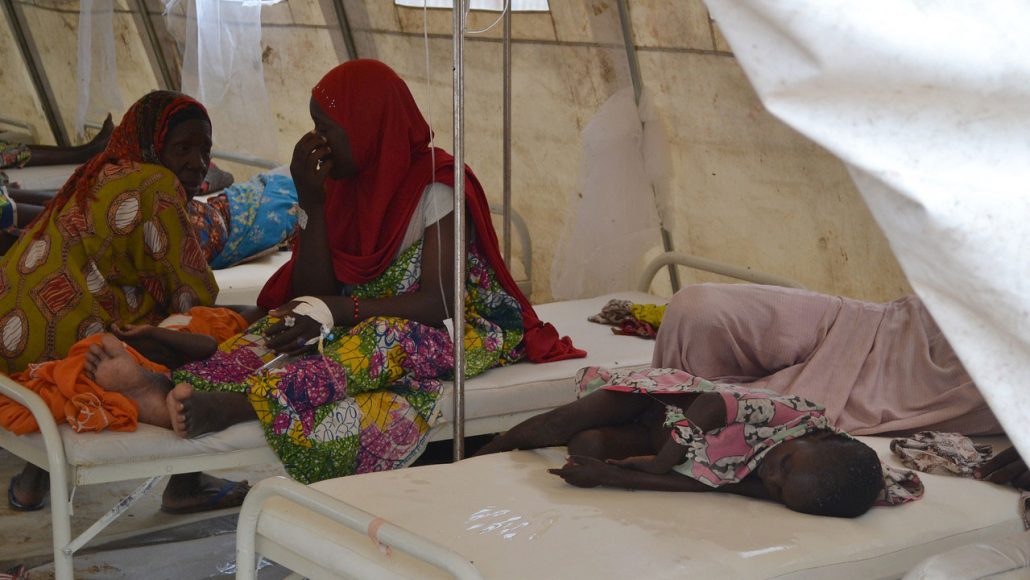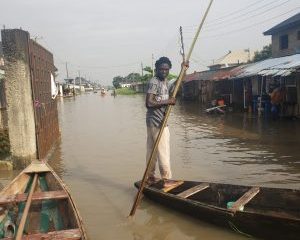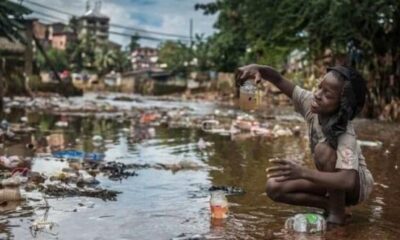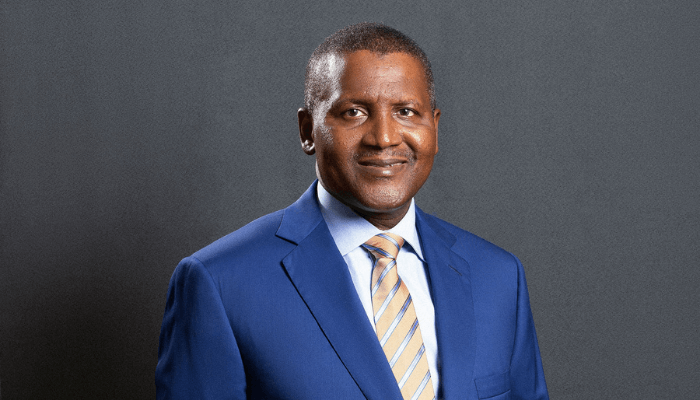Concerns are growing that more Nigerians are going to get infected and many more may die from nationwide cholera outbreak fueled by flooding, terrorism-related activities, civil unrest, lack of proper environmental sanitation as well as shortage of vaccines.
This is as United Nations Children’s Fund (UNICEF), at the weekend, raised the alarm that more than 2.5 million people in Nigeria are in need of humanitarian assistance – 60 per cent of whom are children – and are at increased risk of waterborne diseases, drowning and malnutrition due to the most severe flooding in the past decade.
The floods, which have affected 34 out of 36 states in the country, have displaced 1.3 million people. Over 600 people have lost their lives and over 200,000 houses have either been partially or fully damaged.
Cases of diarrhoea and water-borne diseases, respiratory infection and skin diseases have already been on the rise. In the Northeastern states of Borno, Adamawa and Yobe alone, a total of 7,485 cases of cholera and 319 associated deaths were reported as of October 12.
UNICEF Representative in Nigeria, Cristian Munduate, said: “Children and adolescents in flood-affected areas are in an extremely vulnerable situation. They are particularly at risk of waterborne diseases and emotional and psychological distress. UNICEF is working closely with government and other partners to provide life-saving assistance to those who are most in need.”
According to UNICEF’s Children’s Climate Risk Index (CCRI), Nigeria is considered at ‘extremely high risk’ of the impacts of climate change, ranking second out of 163 countries.
Children in ‘extremely high risk’ countries face a deadly combination of exposure to multiple climate and environmental shocks combined with high levels of underlying child vulnerability, due to inadequate essential services, such as water and sanitation, healthcare and education.
Also, raising the alarm bell is the International Rescue Committee (IRC), which said at the weekend that it is already scaling up its response as well as sanitation, hygiene and health programmes to stop the spread of cholera and save lives.
Nigeria Country Director at IRC, Babatunde Anthony Ojei, said: “Nigeria has not seen flooding like this in more than a decade. At least, 13 states are experiencing a deadly cholera outbreak with more than 6,000 cases and a four – five per cent case fatality ratio. The IRC needs more resources to scale up our health work to treat cholera patients and our water and sanitation programming to help us stop the spread.
“Having contributed less than one percent of the world’s global emissions, yet ranked in the bottom 20 per cent of countries equipped to respond to the impacts of climate change, Nigeria is increasingly bearing the brunt of a crisis it did not cause.
“More than one million children in the Northeast are expected to suffer from acute food insecurity this year, making them more susceptible to succumbing to diseases like cholera. The world, especially countries contributing the most to climate change, must step up and help countries suffering its consequences.”
With more rains expected over the coming months, IRC called for better coordination between Nigeria and Cameroon on excess water releases and appropriate mitigation plans for communities that are in the line of impact.
“If nothing is done, more children and women may die from preventable diseases. The international community must step up to support those in need of life saving care in Nigeria,” he added.
Already, the United States has donated $1 million through the United States Agency for Humanitarian Development (USAID), while signposting Adamawa, Yobe and Borno states as epicentres of cholera outbreak.
The U.S. said that the warning followed the outbreak of the disease in August and September, where at least 7,750 cases were recorded. A statement by the Embassy in Abuja, also expressed concern that the current flooding disaster may worsen the situation.
Also expressing fears about outbreak of cholera and other infectious diseases is Chioma Ezenyimulu, head of Anambra State Primary Healthcare Development Agency, who said flood has ravaged seven of the 21 councils of the state.
Latest figures from the Nigeria Centre for Disease Control (NCDC) suggest that a total of 10,745 suspected cases, including 256 deaths, with case fatality ratio of 2.4 per cent have been reported from 31 states in 2022.
According to Cholera Situation Report-Monthly Epidemiological Report 8, published by NCDC, the 31 states are: Abia, Adamawa, Akwa Ibom, Anambra, Bauchi, Bayelsa, Benue, Borno, Cross River, Delta, Ekiti, Gombe, Imo, Jigawa, Kaduna, Kano, Katsina, Kebbi, Kwara, Lagos, Nasarawa, Niger, Ondo, Osun, Oyo, Plateau, Rivers, Sokoto, Taraba, Yobe and Zamfara.
The NCDC said there was 42 per cent increase in the number of new suspected cases in September (4,153), compared with August. Also, the World Health Organisation (WHO), at the weekend, said 29 countries have reported cholera cases this year, including Haiti, Malawi and Syria, which are facing large-scale outbreaks. The tally shows a clear uptick on previous five years, when fewer than 20 countries on average reported outbreaks.
WHO has said it is particularly concerned about the fatality rate, which this year was almost three times the rate of the past five years. The organisation, also, said dire shortage of cholera vaccines amid an unprecedented rise in global cases has forced health officials to halve the number of doses given to people in outbreak hotspots, adding that the ‘exceptional decision’ to reduce the number of doses from two to one would allow for the vaccines to be ‘eked out’ until the end of the year, and given to more people in more countries.
Executive Director for WHO’s Health Emergencies Programme, Mike Ryan, said the decision marked “a sad day. We shouldn’t have to do it. And it is purely based on the availability globally of vaccines.”
Cholera is a waterborne disease and is easily treatable if responded to in a timely fashion, but can kill within hours if not.
The International Coordinating Group (ICG), the body that manages emergency stocks of vaccines, had taken the decision because of the “extremely limited” supply, WHO said in a statement, reiterating previous calls for “urgent action” to boost global vaccine production.
Of the total 36 million doses forecast to be produced this year, 24 million have already been shipped and eight million more have been earmarked for emergency vaccination campaigns, leaving just four million doses in the global stockpile.
Speaking in Geneva, Switzerland, the Director General of the WHO, Dr. Tedros Adhanom Ghebreyesus, said the move was “clearly less than ideal.
“Rationing must only be a temporary solution,” Ghebreyesus said. “In the long term, we need a plan to scale up vaccine production as part of a holistic strategy to prevent and stop cholera outbreaks.”
This scarcity will only be exacerbated by a key manufacturer’s decision, revealed by The Guardian last week, to discontinue production of one of the two oral cholera vaccines used in humanitarian emergencies.
“As vaccine manufacturers are producing at their maximum current capacity, there is no short-term solution to increase production,” WHO said.
MEANWHILE, a study published in Eurasian Journal of Medicine and titled ‘Analysis of Factors Contributing to the Spread of Cholera in Developing Countries,’ noted: “The findings of this study identified some factors that play a significant role in causing the cholera epidemic in the country. These factors include, but are not limited to, terrorism-related activities and civil unrest, which prevents people from access to clean water, and lack of proper environmental sanitation.
“Another factor that causes cholera epidemic is flooding due to heavy rainfall, which is prevalent in the areas covered by the case study because of inadequate drainage system. This problem usually contaminates the rivers and streams (which is the source of water for most people in the area) with dirty items, particles, and human and animal waste.
“Similarly, lack of proper sewage disposal has been identified as another causative factor because people sell and buy food closer to the bins, which in turn contaminates the food and water around the area. A cholera epidemic can occur when people consume the infected foods and water.
“Another causative factor identified by the study includes the unhygienic environment. Findings from the study also revealed that people who were infected did not bother to get appropriate treatment as a result of the fear of intimidation or victimisation. Others did not get treatment due to financial incapability and poor support from the government.”
The study findings identified some key lessons that are essential for enhancing the prevention and control of cholera. Firstly, although the seasonal distribution of cholera infection does not apply in Nigeria, the time of outbreaks and geographical distribution is however predictable.
Secondly, there exists substantial evidence on the menace and protective dynamics of the transmission of cholera; taking into cognisance inhibiting factors, such as consumption of contaminated water, unhygienic environment, and inappropriate disposal of waste products, which are all possible routes for the transmission of cholera.
Thirdly, the proper and adequate availability of information and awareness of the people regarding the mode and pattern of cholera transmission can help reduce the occurrence of cholera infection and death.

 News3 years ago
News3 years ago
 Entertainment2 years ago
Entertainment2 years ago
 News3 years ago
News3 years ago
 Privacy3 years ago
Privacy3 years ago
 Sports2 years ago
Sports2 years ago
 Entertainment2 years ago
Entertainment2 years ago
 News3 years ago
News3 years ago
 Opinion3 years ago
Opinion3 years ago















